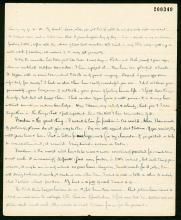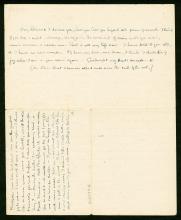BRACERS Record Detail for 19360
To access the original letter, email the Russell Archives.
"Sunday evg" "I want to write a book on ethics to embody what I believe about freedom."
"Politics have ceased to interest me much since the collapse of the Russian revolution".
There are two transcriptions of this letter: document .052450, record 99927; document .201152, record 116381. Both of these contain an abbreviated version of document .200349A, record 19373.
Letter 100
BR TO CONSTANCE MALLESON, 8–9 SEPT. 1918
BRACERS 19360. ALS. McMaster
Previous Brixton letter, BRACERS 19359; next letter, BRACERS 52370
Edited by K. Blackwell, A. Bone, N. Griffin and S. Turcon
<Brixton Prison>1
Sunday evg Sp. 8. ’18.
My Heart’s Love, when you get this it will be only 3 weeks till we meet.2 It seems now such a little time that I grow happier day by day. I am tired in my emotions, feeling little, after all the stress of these last months. Not tired in any other way: getting on with work (reading, not writing) and very fit generally.
Today the weather has been just like those 2 early days in Richmond Park, nearly 2 years ago, when we watched sudden tornados.3 I have enjoyed it — there have been splendid clouds. It began with a rainbow, which I took as of good augury. Doesn’t 2 years ago seem infinitely far away? I had no idea then how really wonderful you are. I did not know your generosity, your largeness of outlook, your power of feeling human life. I felt those things dimly, but did not know them. I had no idea of your force and will-power. It is strange how instinct sometimes outruns knowledge. Now I know, very calmly and soberly, that you and I are together in the things that I feel important. Since Clee Hill I have been certain of it.
Freedom is the great thing. I want to live for freedom in the world. When I have moods of jealousy, please do not give way to them. They are all against what I believe. If you resist, they will grow less and less. That is better for our happiness and for my character. If you yielded or took to concealment, it would bring disaster sooner or later.
Freedom in the world will have to be more and more consciously provided for: conditions must make it increasingly difficult. Just now, freedom is little valued, but such things go in waves; it may be immensely valued 20 years hence. Anyway, I will work for it, when I am not doing technical work, and sometimes even when I am. I want to write a book on ethics to embody what I believe about freedom.4 My head is so full of work I want to do.
The Trade Union Congress has been so-so.5 Might have been worse. But politics have ceased to interest me much since the collapse of the Russian Revolution.6 I feel now that I am disillusioned as to politics and must seek other roads to what I care for — for the present.
O my Beloved I do love you, love you, love you beyond all power of words. I think of you day and night, always imagining the moment of being with you again, coming nearer and nearer now. That is all my life now. I have told it you all, and I have no new words. My dear, my dear, my dear, I think I shall die of joy when I am in your arms again. Goodnight my Heart’s Comrade.
B.
[One other sheet7 and various odds and ends near the end of the volume.]
Monday mg. Your letter last Wed. has been the greatest joy to me. I have read it over and over again. I should like to know more about your health, was it the old trouble8 you had before? What did your woman Dr. say? — Among the books I am returning Wed. is Moll Flanders9 — tell Miss Rinder it would amuse her to read it — it would amuse you too but I fancy you are too busy for books. — I grow so happy as the end comes near. Tell me more about Eve10 when you can and feel in the mood. I am sure I should like her. I was always sorry I didn’t like Marie better, seeing what close friends you and she were. Goodbye my Darling.
B.
- 1
[document] The letter was edited from the initialled, twice-folded, single-page original in BR’s handwriting in the Malleson papers in the Russell Archives. The “Monday mg.” passage was written on one of the exposed quarters when the sheet was folded, with the other remaining blank.
- 2
only 3 weeks till we meet In fact, it was less than a week, as BR was granted an earlier than expected remission of his sentence by Sir George Cave, the Home Secretary.
- 3
those 2 early days in Richmond Park ... sudden tornados They spent a memorable day in Richmond Park early in their relationship on 24 October 1916, Colette’s birthday. By “tornados” he surely meant strong winds. BR often recollected this time. In an earlier letter, Letter 81, he remembered “the 2 rain-storms in Richmond Park”, the second outing doubtless being one she agreed to on 31 May 1917 (BRACERS 113133). Colette recollected being in “Richmond Park with storm and rain tearing the giant oaks” in her letter of 31 May 1918 (BRACERS 113133).
- 4
want to write a book on ethics … freedom He did not write a book devoted to theoretical ethics until 1954 (Human Society in Ethics and Politics), but freedom in social relations was a common theme in his post-war books.
- 5
Trade Union Congress has been so-so BR was possibly thinking of the discussion of British war policy and peace terms at this annual conference of organized labour held in Derby from 2 to 7 September 1918. The agreed resolution contained some internationalist language that offered something to the dissenting minority inside the trade union movement, while insisting, to the satisfaction of the patriotic labour majority, that peace negotiations not be started before France and Belgium had been evacuated by the enemy. While BR regarded the upshot of these proceedings as “so-so”, British labour intelligence officials were gratified by the extent of support for the war effort on display at the Trade Union Congress — as revealed, for example, by congratulatory telegrams to Britain’s military commanders and the cheering of encouraging news from the Front (see Trevor Wilson, The Myriad Faces of War: Britain and the Great War, 1914–1918 [Oxford: Basil Blackwell, 1986], p. 658).
- 6
collapse of the Russian Revolution BR saw a revolution unravelling in the face of internal chaos and misery, counter-revolutionary resistance, and Allied military intervention. He believed that these convulsions could have been avoided if the Allies had responded to Russian peace feelers after the March 1917 revolution — but before the Bolshevik seizure of power eight months later — by pushing for a negotiated end to the war. He regarded the November revolution as a by-product of this diplomatic failure, but in August 1918 he did not welcome the “collapse” he anticipated. Famously critical of Bolshevik tyranny in later years, BR did not arrive at that hostile appraisal until he travelled to Russia with the British Labour Delegation in 1920. Prior to that visit, he was much more sympathetic to the revolutionary regime and what may be called its political theory (see “Socialism and Liberal Ideals” [1920; see its other titles in B&R C20.14; 32 in Papers 15]). His perspective was similar to that of Britain’s radical Whigs on the French Revolution, who blamed Jacobin extremism on the intemperate reaction of other European powers to events in France after 1789. In February 1918, BR went further, casually excusing the Bolsheviks for dissolving the Constituent Assembly — although this letter of 2 February to Clifford Allen can be read less as an affirmation of patently undemocratic action by Russian revolutionaries than as an expression of disgust with British parliamentary politics and “Cabinet Caesarism” (see Papers 14: xlix, li).
- 7
[One other sheet If extant, it and the “odds and ends” were not found in the Malleson papers in the Russell Archives.
- 8
Your letter last Wed. … the old trouble There are edited letters from her written on 2–3 September 1918, that is, on the Monday and Tuesday (BRACERS 113155 and 113156). The first letter does mention her health: “My doctor, by the way, thinks my inside needs attention (same old trouble).” See also Letter 95 and note 4.
- 9
Moll Flanders Daniel Defoe’s The Fortunes and Misfortunes of the Famous Moll Flanders (1722). BR’s remark seems to suggest that this was the first time he had read Defoe’s rollicking picaresque novel, written as the autobiography of the enormously likeable Moll Flanders, thief, pickpocket, and woman of easy virtue. It was not a novel the Victorians liked, but appreciations by members of the Bloomsbury group, especially Virginia Woolf and E.M. Forster, restored it to popularity. In a letter of 1925, BR singled out Defoe’s prose style for praise (J.K. Piercy, ed., Modern Writers at Work [New York: Macmillan, 1930], pp. 11–12).
- 10
Eve Evelyn Walsh Hall appeared both on the stage and in films. Colette described her as a new acquaintance, “not attractive, and perhaps a bit rigid”, although a great admirer of BR (20–21 Aug. 1918; BRACERS 113152). See also note 8 to Letter 78.


